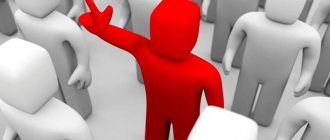Psychology studies not only the general laws and patterns of mental processes and states. We are all different, unique and inimitable individuals, therefore knowledge of the individual psychological characteristics of a person is no less important than the mechanisms and processes of the psyche that are characteristic of all people. This area is studied by a branch of psychology called differential psychology, or the psychology of individual differences.
How individual psychological characteristics of a person manifest themselves
Psychology studies the general and individual laws of formation and development of the psyche. By the way, they are studied not only by psychology, but also by philosophy and sociology. The first (general patterns), for example, includes the theory of age-related crises, the concept of psychological defense mechanisms. The second is ideas about the formation of individual psychological characteristics. What applies to them? Individual psychological characteristics of a person include temperament, character and its individual traits, abilities, and emotional-volitional sphere.
How and in what ways are individual psychological characteristics manifested? Yes in everything. For example, how we react to certain events or how we tell a story is directly related to temperament. Choleric people give in to emotions and gesticulate a lot. Phlegmatic people are reserved, pay attention to little things, and objectively assess the situation. However, we have already gotten a little ahead of ourselves. Let's look at each of the main individual characteristics in more detail, including temperament.
Interesting! The study of individual psychological characteristics deals with a special branch of psychology - differential psychology, or the psychology of individual differences. It explains why people behave differently in the same situations, why children with completely different futures grow up in the same conditions, etc.
Meaning in religion
The concept of personality in psychology varies, depending on the statements of representatives of religious movements.
Christianity
Christianity distinguishes several types of personalities:
- people, because they were created by God in their own image;
- demons, angels.
- The Holy Trinity.
Christian teachings assert that a person becomes a person at the moment of conception. Since he is born by the will of God, the personality constantly develops, reveals itself from different sides, improves, and enriches itself. People are free from birth.
The individual controls his own development. He can be brilliant or mediocre, attractive or disgusting, selfish or heroic, suspicious or selfless, criminal or honest, good-natured or furious, cunning or straightforward, loving or manic.
Wild animals and domestic animals cannot be called individuals. They do not have abstract judgment, self-awareness, or the desire to understand the essence of what is happening. Christianity tolerates the killing of animals, but prohibits abortion.
Buddhism
In Buddhism, this concept relates to the soul. Another word used to denote it is pudgala. The main Buddhist doctrine states that the soul, the pudgala, does not exist. The main teachings of this religious movement define personality as a combination of five groups of elements, which is called Skandhm Dharm:
- feeling unpleasant, pleasant, neutral;
- the ability to form concepts and make distinctions;
- presence of activity, will;
- Consciousness.
The fifth group is the physical component of a person. Individuals who believe in pudgala violate the rules of Buddhism are considered ignorant.
Other religions
In Hinduism, it is forbidden to kill any living beings, since this religion considers animals to be potential individuals who can become people in another life, after rebirth.
Temperament
Temperament is a type of nervous system, an innate characteristic. This is a set of psychophysical properties of a person that determines the specifics of performing an activity. Rhythm, speed, intensity of reactions - all this depends on temperament. Let's take a closer look at the types of temperaments, and then their properties.
Types of temperament according to Hippocrates
Hippocrates was the first to talk about temperaments. He identified four personality types based on which fluid predominates in a person:
- Holi (bile). These are active and sometimes fussy people. They are characterized by sudden mood swings and sociability, turning into obsession.
- Phlegm (mucus). These are calm, reasonable, slow people.
- Melan holi (black bile). These are pessimists, in a state of decline and characterized by indecision.
- Sangwa (blood). These are active and persistent people who always achieve their goals. Born leaders.
Since then, many studies have been carried out, different classifications of temperaments have appeared, but this typology is still taken as a basis. True, no one talks about the predominance of liquids anymore, and the names have changed a little. The study of temperaments is conducted around the reactions of excitation and inhibition. And the main person in this theory is considered to be I.P. Pavlov.
Temperament in modern psychology
In modern psychology, the following classification of temperaments is used:
- Choleric. Strong, agile, unbalanced type. They say about these people: “Starts with half a kick.” True, the choleric person cools down just as quickly. Moreover, he not only cools down, but forgets the reason for the quarrel, the unpleasant fact itself. Therefore, it is difficult to resolve disagreements with choleric people. Cholerics have leadership qualities, but lack of restraint and emotionality prevent them from achieving a stable result in life.
- Sanguine. Agile, balanced, strong type. The processes of excitation and inhibition occur quickly, but this does not affect the mood as clearly as in a melancholic person. Sanguine people are more into humor. They can be called easy-going. They are distinguished by high adaptive abilities, flexibility, and sociability. These are positive and active people who know how to find an approach to every person and have leadership characteristics. A sanguine person does not tolerate boredom and monotony. It is characterized by high speed and strength in performing activities.
- Phlegmatic person. Strong, balanced, motionless type. The arousal reaction is weak. Phlegmatic people are distinguished by restraint and prudence, which sometimes turn into tediousness. These are the executive and most responsible workers, but living with a phlegmatic person is difficult. He is stingy with emotions, does not know how to empathize, is cautious and passive. Does not like surprises, experiments, novelty. His restraint, resistance to stress and composure are sometimes mistaken by others for indifference. Phlegmatic people do not like changes in activity.
- Melancholic. Weak, unbalanced, mobile type. Like a choleric person, his mood constantly fluctuates, but negative connotations predominate. This is a passive, insecure, vulnerable type. Gets tired quickly and does not adapt well to changes. At the same time, these are the most sincere and empathetic people with a rich and interesting inner world.
Cholerics
Personal characteristics of a person with a choleric type of higher nervous activity include the following emotional characteristics:
- Restlessness, because choleric people find it difficult to focus on one thing. They are capable of starting a business, but not finishing it.
- Impulsiveness - such people live by emotions. Under the influence of impulse, they commit the most unpredictable actions, for which they blame themselves.
- Rapid arousal, which is due to temperament. They lose their temper very easily and are not shy about showing emotions. But the outbreak quickly fades away, and the choleric person becomes ashamed of the negative emotions shown.
- Burnout. Routine work is not for choleric people, nor are things that require maximum concentration. These people, due to their emotional and personal characteristics, quickly get tired and burn out.
Character
Character is a complex of acquired personality traits. Don’t believe those who say: “That’s my character” or “We don’t get along.” Unlike temperament, character can be changed.
First, let's define the concept. Character is a complex of stable personality properties that determine a person’s behavior and reactions and his attitude towards other people and himself. Now let's look at several character classifications.
Classifications
S. Freud, within the framework of his theory of psychosexual personality development, identified the following types of character:
- Oral. This is an irritable person prone to overeating, alcohol abuse, smoking and other addictions. Among people of this type there are representatives of two subspecies: passive-oral and oral-aggressive. The first are distinguished by naivety, suggestibility, and knowledge. The latter are characterized by cynicism, often show aggression, crave power, and tend to manipulate people.
- Anal. These are overly pedantic, secretive people prone to hoarding. As with the oral character, there are two subtypes: anal-retentive and anal-thrust. People of the first type are distinguished by greed and stubbornness. People of the second type are characterized by emotional instability and an aggressive desire for leadership.
- Phallic. People of this type try to demonstrate their masculinity/femininity as much as possible in everything. And not in the best forms: impudence, bitchiness, depravity. These are people of extremes. They either hate themselves or they adore them; or remain faithful, or regularly engage in casual relationships; or are overly cautious, or lead a wild and dangerous lifestyle, etc.
- Genital. According to Freud, this is the optimal, healthy type of character. He is characterized by a high level of stress resistance, developed adaptive abilities, sociability, openness, and activity. Such people achieve success in all areas of life and know how to win people over.
Another psychoanalyst, Alexander Lowen, named these types of characters:
- Oral. These are people who depend on other people's opinions and are afraid of being rejected and abandoned. Every minute they demand attention to themselves, waiting for words of love. However, they do not know how to give off heat.
- Masochistic. These are secretive, distrustful and vindictive people, prone to self-punishment and self-flagellation. They are used to playing the role of a victim and suffering. Those who find themselves next to them become unwitting participants in some kind of drama.
- Hysterical. These are very artistic people. They do not live, but play on stage. Their every word, reaction, gesture is clearly verified and rehearsed. However, excessive emotionality prevents you from making and implementing long-term plans. Such people need emotions, so they constantly get into some kind of trouble, become participants or instigators of scandals and fights.
- Narcissistic. These are people who are guided solely by personal interests. People for them are tools, a means to achieve personal goals. A narcissist does not know how to empathize or sympathize. He asserts himself at the expense of others. He cannot stand loneliness, as he needs to see, hear and feel admiration for himself.
- Schizoid. People who live in their own world. Outwardly it seems that they are cold, callous, indifferent. But that's not true. Passions boil in the inner world of a schizoid; he knows how to love and get carried away by something. But he does not tolerate “water” or anything superficial. Carefully chooses friends, hobbies, and work.
Development
Personal development occurs in the process of life journey, personal growth. A person continues to develop throughout life. The path of life is shaped by values, motives, and goals.
The life path is often called the script of human life. Scientists disagree on this point:
- One group of researchers believes that a person independently creates the script of his own life, but in the initial stages he is influenced by his parents.
- Another part of the researchers argue that a person moves according to a formed scenario unconsciously. The leading factors are parental upbringing, random stress, chosen first name, last name.
Personal growth is a product of life's journey. It determines the subject’s capabilities in managing his own life, communicating with others, and defending his position in various situations.
The study of personality occupies a central position in psychological science. A separate direction was developed to conduct research, collect information, and systematize data.
Capabilities
Abilities are innate data. To be more precise, from birth we are given inclinations, and in the future it depends on the conditions of human development whether they develop abilities or not. Inclinations are anatomical and physiological features of the nervous system that serve as the basis for the formation of abilities. Abilities are personality traits that help one achieve greater success in performing any activity compared to other people.
Abilities can be biologically determined (given by nature) and socially acquired (specific abilities). In addition, in psychology it is customary to distinguish the following types of abilities:
- Are common. They help you achieve success in any type of activity. Examples of general abilities: good memory, high stability of attention and mental agility.
- Specialized. Increase the chances of success in mastering a specific activity. Examples: musical ear, artistic taste.
Among the special abilities are the following types:
- musical,
- artistic,
- sports,
- literary,
- creative,
- educational,
- intellectual,
- mathematical,
- others.
On the subject of interaction, it is customary to distinguish the following abilities:
- interpersonal – a person easily establishes social contacts;
- subject - a person is better able to interact with objects than with people.
In addition, theoretical and practical abilities are distinguished. In the first case, a person is more inclined to analysis and reasoning. In the second case, a person prefers to implement his activities through active actions.
According to the degree of development, abilities are reproductive (repeating someone else’s experience, knowledge) and inventive (creating something unique, new).
The essence of the concept
Personality psychology, as a separate direction, was discovered by William James. This is a transpersonal psychologist who created the philosophical theory of pragmatism. The theory says that personality is a connection between habits, instincts and the volitional qualities of the subject.
But we must not forget that the term “personality” was originally introduced by N.M. Karamzin. He described the personality as the master of life, destiny, who has a rich spiritual world. He is responsible for his actions and behavior. A person gradually becomes a person, and is not born with one.
Basic concepts:
- Personality is a product of society in a person. After birth, the subject is endowed with only a biological element, but the formation of personality begins at birth. A person gradually begins to assimilate social experience.
- Psychology distinguishes between the internal and external world of the individual.
For the formation of a subject as a person to occur, he must make efforts:
- master speech skills;
- gain intellectual, socio-cultural, motor skills.
Developmental activity depends on the ability to assimilate new information. To finally understand the concept of personality, you need to study other terms:
- individuality - a set of unique character traits;
- individual - a person as a representative of his own species.
At the same time, you need to understand that any subject is unique, but not everyone becomes a person.
Emotions
Emotions are a mental reaction to any events. An emotional reaction is always subjective and has nothing to do with objective facts. Emotions are associated with the individual needs of the individual, as well as beliefs and experiences.
By type, emotions can be positive or negative. The first includes joy, passion, enthusiasm, faith, optimism, hope, satisfaction. The second - boredom, irritation, disappointment, anxiety, despondency, fear, sadness, excitement.
Psychologist B.I. Dodonov proposed the following classification of emotions according to the specifics of the situations in which they arise:
- communicative;
- altruistic;
- practical (occurs after the successful implementation of the plan);
- gloric (associated with the need for self-affirmation);
- fearful (occurs in situations of risk, danger);
- romantic;
- aesthetic;
- Gnostic (associated with the desire for knowledge);
- active (associated with accumulation, gathering);
- hedonistic (associated with any pleasures).
Emotions are situational experiences. They are short-lived. If you continue to experience the same thing after the situation ends, then this is the feeling. However, in practice, the first and second are often identified.
Research methods
Psychologists identify several effective methods for studying personality:
- Observation is an old way of obtaining information about the behavior and habits of an individual. It can be everyday or scientific. During everyday observation, the researcher receives general information. In scientific observation, scientists analyze the data they receive.
- Conversation - the researcher conducts an in-depth conversation with the subject so that he himself talks about his experiences, emotions, thoughts.
- Interview - The researcher creates a list of questions for the subject to answer. They can be one-dimensional or multidimensional.
- An experiment is a practical technique that allows you to obtain information about behavior and reactions. To do this, the researcher intervenes in the subject’s usual life and creates certain conditions for reactions to occur.
A separate group of studies is projective methods. The subject must describe changes in his state when interacting with various stimuli.
Will
Will is a person’s ability to consciously regulate his behavior and activities. The presence of will presupposes overcoming external and internal obstacles on the path to the goal. The will is formed by the age of 5-6 years. Until this moment, the child has only involuntary activity. But gradually the child learns to structure his motives and desires, overcome difficulties, and analyze his thoughts and actions.
Will is manifested in such character traits as perseverance, determination, dedication, independence, courage, endurance, diligence, and discipline. The presence of these qualities is noticeable at the cognitive, emotional and behavioral level.
Teenagers
The most complex human specimens. The basis of the personal characteristics of adolescents is moral immaturity, a heightened sense of justice and emotional instability. A teenager is no longer a child, but not yet an adult, although he very diligently pretends to be this role. His hormonal levels change, external changes occur, and his internal balance is disrupted. Yesterday's beautiful little girl suddenly discovers the appearance of pimples and greasy skin. For an adult who is confident in himself, this is not a problem. But for a teenager it’s a whole complex. Most of them are unsure of themselves; under their aggressive behavior there is a lot of fears and complexes hidden.
What should others do when communicating with such a “hedgehog”? Keep in mind that at this stage of development, personal characteristics are a changing factor. And correct the teenager’s unwanted behavior only with the help of positivity and positive reinforcement.
Communication skills
- Choleric people are the most active, hardy, bright and strive towards their goal.
- Melancholic people, on the contrary, are vulnerable, calm, and indecisive.
- Phlegmatic people communicate easily, they are reliable friends and co-workers who adequately assess any situation.
- Sanguine people are sociable, sincere, sympathetic and friendly.
The foundation of this parameter is motivation. It represents a person’s daily activities and explains his actions. Some people want to satisfy their physiological needs, they want to eat delicious food, live in a cozy apartment or drive a modern car. For others, it doesn’t matter, and their priorities include communication, new information, making acquaintances, realizing their creative potential, and playing sports.











